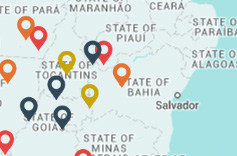IDEAS – Popular Advice
We are not enemies! Community mobilization to combat genocide, inmate overcrowding, institutional racism, and police violence
Bahia
Objetivos e público prioritário
Provide advice to vulnerable communities, working to meet the need for social mediation aimed at confronting criminalization, institutional racism and the reduction of arrests for possession, consumption, and commercialization of drugs, which only have the testimony of police officers as supporting evidence.
Main activities
Activity 1
Holding meetings to present the project and gather information, contributing to the monitoring of information on intentional violent deaths.
Activity 2
Articulation aimed at contributing to the implementation of the Mechanism to Combat and Prevent Torture in Bahia.
Activity 3
To stimulate the formation of a Community Group to combat police violence.
Activity 4
Contribute to the organization of the Center for Mothers and Family Members Victims of State Violence in Bahia.
Activity 5
Influence the formation of public opinion on the matters of mass incarceration, institutional racism, police violence and genocide of the Black people, contributing to a critical view of the discourse of urban security and the drug war.
Context
Currently, 54% of the world’s population lives in urban centers. When analyzing data from Latin America, this number exceeds 80% of the population. It is a region that concentrates the most significant urban population on the planet, and that has seven of the eight largest cities in America (São Paulo, Mexico City, Lima, Bogota, Rio de Janeiro, Caracas, and Santiago).
A quarter of Latin America’s urban population – 111 million people – live in favelas or informal settlements; 124 million people live in poverty, more than half in Brazil (37 million) and Mexico (25 million), countries that account for 29 of the 50 most violent cities in the world.
These data are from the Mexican organization Seguridad, Justicia y Paz.
Brazil has 17 of the 50 most violent cities in the world and accounts for more than 14% (61,619 in 2016) of homicides committed. When compared to data of missing people in Brazil, which in the decade is superior to that of homicides, these data gain strong indications of underreporting. Such underreporting is possible due to the still impressive number of slaughters, enforced disappearances and clandestine cemeteries existing in Brazil.
Of the 17 Brazilian cities among the 50 most violent cities in the world, 11 are in the Northeast. Of the nine capitals of the Northeast, only São Luís, in Maranhão, was left out, but according to the publication, it is the 51st most violent city in the world. Of the 17 Brazilian cities in the ranking, three are in Bahia – the international ranking only considers cities with more than 300 thousand inhabitants.
About the organization
IDEAS – Popular Advice acts to affirm the right to the city, primarily through giving visibility to the conflicts arising from the development model based on the usurpation of the territory, the culture and the life of the Black people. It seeks the empowerment of communities and movements. Since 2012, it has been working as an advisor to the Homeless Movement of Bahia, and since 2014 it has been working at the Centro Antigo in Salvador in the articulation of a network of urban resistance.
The organization was already supported in 2016 through the Project Justiça Intramuros – Combating institutional racism in cases of precautionary and provisional arrests resulting from trafficking, theft and petty theft; in 2015, through the Project Resistências populares urbanas: evidencing the land conflicts arising from the current gentrification project of the Old Center of Salvador; and in 2014, through the Project Articulação das Ocupações do Centro Antigo de Salvador: Resistência Negra contra impactos da Copa do Mundo FIFA 2014. (Articulation of the Occupations of the Old Center of Salvador: Black Resistance against impacts of the 2014 FIFA World Cup).
Funding Line
Fighting Racism from the Bottom Up
Year
2018
Total Granted
R$ 70 mil
Duration
18 months
Main Themes
Confronting racism






